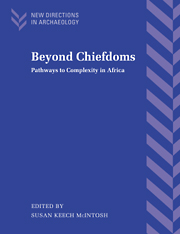Book contents
- Frontmatter
- Contents
- List of figures
- List of tables
- List of contributors
- Preface
- 1 Pathways to complexity: an African perspective
- 2 The segmentary state and the ritual phase in political economy
- 3 Perceiving variability in time and space: the evolutionary mapping of African societies
- 4 Western representations of urbanism and invisible African towns
- 5 Modeling political organization in large-scale settlement clusters: a case study from the Inland Niger Delta
- 6 Sacred centers and urbanization in West Central Africa
- 7 Permutations in patrimonialism and populism: The Aghem chiefdoms of Western Cameroon
- 8 Wonderful society: the Burgess Shale creatures, Mandara polities, and the nature of prehistory
- 9 Material culture and the dialectics of identity in the Kalahari: AD 700–1700
- 10 Seeking and keeping power in Bunyoro-Kitara, Uganda
- 11 The (in)visible roots of Bunyoro-Kitara and Buganda in the Lakes region: AD 800–1300
- 12 The power of symbols and the symbols of power through time: probing the Luba past
- 13 Pathways of political development in equatorial Africa and neo-evolutionary theory
- Index
9 - Material culture and the dialectics of identity in the Kalahari: AD 700–1700
Published online by Cambridge University Press: 14 October 2009
- Frontmatter
- Contents
- List of figures
- List of tables
- List of contributors
- Preface
- 1 Pathways to complexity: an African perspective
- 2 The segmentary state and the ritual phase in political economy
- 3 Perceiving variability in time and space: the evolutionary mapping of African societies
- 4 Western representations of urbanism and invisible African towns
- 5 Modeling political organization in large-scale settlement clusters: a case study from the Inland Niger Delta
- 6 Sacred centers and urbanization in West Central Africa
- 7 Permutations in patrimonialism and populism: The Aghem chiefdoms of Western Cameroon
- 8 Wonderful society: the Burgess Shale creatures, Mandara polities, and the nature of prehistory
- 9 Material culture and the dialectics of identity in the Kalahari: AD 700–1700
- 10 Seeking and keeping power in Bunyoro-Kitara, Uganda
- 11 The (in)visible roots of Bunyoro-Kitara and Buganda in the Lakes region: AD 800–1300
- 12 The power of symbols and the symbols of power through time: probing the Luba past
- 13 Pathways of political development in equatorial Africa and neo-evolutionary theory
- Index
Summary
Introduction
A major current issue throughout southern Africa is the manner by which the false convergence of tribal/ethnic allegiance and ideology initiated by Europeans during the colonial era can be unraveled. This requires a new formulation of the history of the subcontinent – one which will rely on archaeological materials to provide a firm historical basis for assessing the trajectory of precolonial social and economic formations and their transformations in the colonial period. Yet, until recently, anthropologists and historians have tended to view the entire region before the latter part of the nineteenth century as having been populated by isolated cultural and linguistic entities with few connections among them. Khoisan-speaking people in the Kalahari, for instance, have been represented as foragers unaffected by Bantuspeaking agropastoralists until the twentieth century. All local cultures, however, have been historically constructed through ongoing dialogues with others – dialogues characterized as much by social flux as by stability. As Wilmsen and Vossen (1990: 11) point out, “the resultant constructed ethnicities rarely conformed to a people's prior self-identification.”
Current “debates” over the “authenticity” of some Kalahari peoples (Solway and Lee 1990; Wilmsen and Denbow 1990) thus exemplify more general trends in anthropological thought that question the historical utility of ethnographic concepts such as closed cultural traditions, that take on an apartheid-like appearance in the southern African context.
- Type
- Chapter
- Information
- Beyond ChiefdomsPathways to Complexity in Africa, pp. 110 - 123Publisher: Cambridge University PressPrint publication year: 1999
- 16
- Cited by



